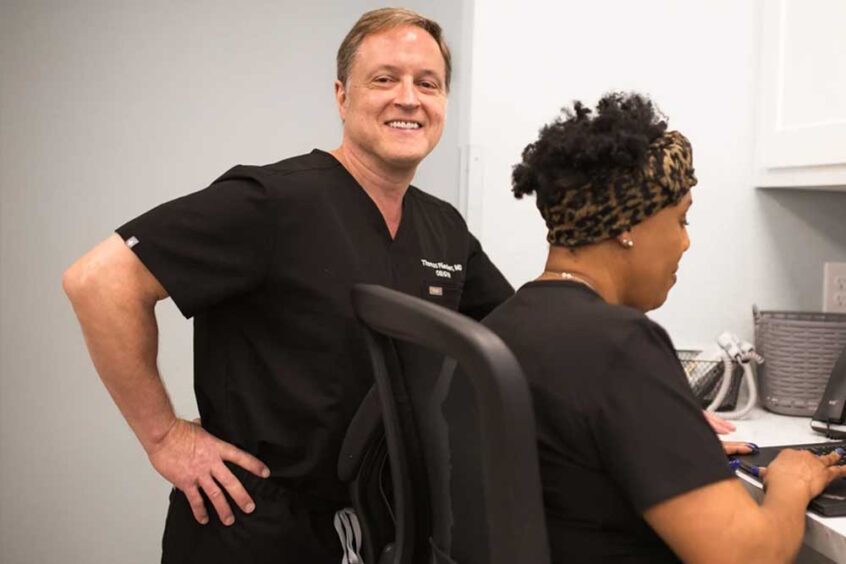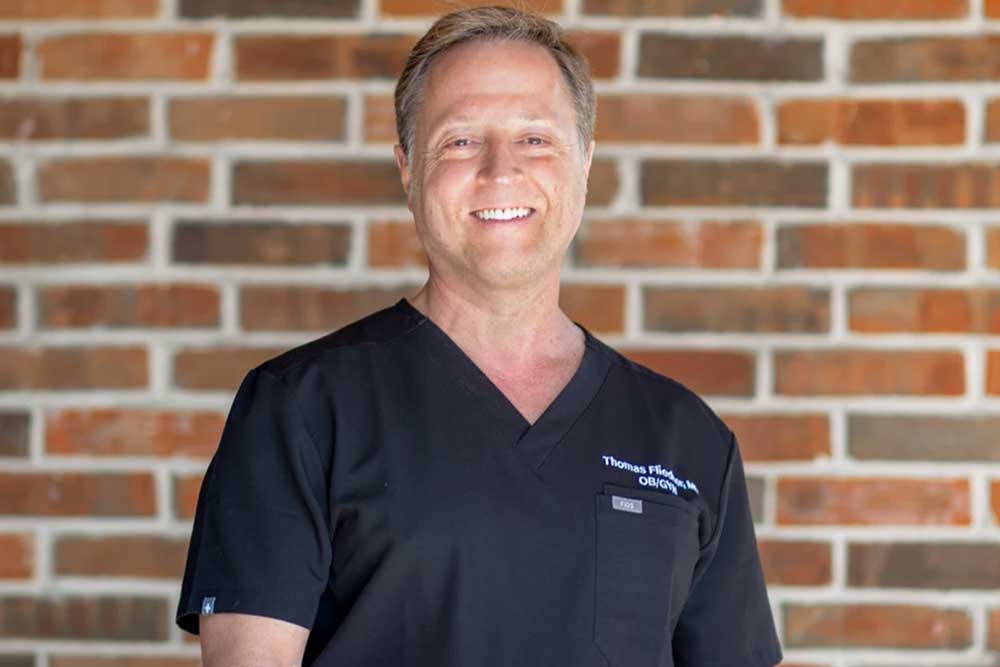A Menopause Specialist Can Reduce the Risk of Age-Related Diseases

For some women, menopause comes as a relief. Finally, an end to pregnancy worries, monthly cramps, and all of the accompanying paraphernalia. While others fear the transition and the new worries it brings, such as hot flashes, insomnia, and low libido. No matter your perspective, menopause can bring new challenges, but with the help of a menopause specialist, the transition can be a wonderful time of life.
“With the guidance of a menopause specialist, a woman can look forward to life during menopause with new excitement and improved health,” says Dr. Thomas Fliedner, board-certified OB-GYN and member of the American Medical Association (AMA).
For the past 30-plus years, Dr. Fliedner has enjoyed the fulfilling career of helping women transition while improving their overall health. According to Fliedner, when menopause is properly managed, particularly from the beginning, women may lower their risk of many common, life-threatening diseases that are typically associated with women in their 50s, 60s, and beyond.
Women must keep a close watch for any changes in their menstrual cycle as they approach their 40s. Approximately four years before a woman has her last menstrual cycle, she will enter into a menopausal transition, known as perimenopause. Women will begin to notice various changes, such as a shorter duration between periods or menopausal symptoms clustered around the time of menses. Symptoms vary among women vary, but these are signs you are in perimenopause.

More Than an OB-GYN
If you’re starting to go through perimenopause, or you think you might be about to make the transition, you may want to consider a menopause specialist, not just an OB-GYN.
According to Johns Hopkins Medicine, fewer than one in five OB-GYNs receives formal training in menopause medicine and hormone therapy. Many great OB-GYNs are terrific during the reproductive years but have no training or experience treating menopausal women with hormonal therapy.
According to JoAnn Pinkerton, M.D., former president of the North American Menopause Society, women need to find a menopause specialist to find the best and safest hormonal therapy.
What Is a Menopause Specialist?
A menopause specialist, also known as a menopause clinician or menopause healthcare provider, is a medical professional who specializes in the field of menopause.
Menopause specialists are typically healthcare providers with expertise in women’s health, gynecology, or endocrinology. They have in-depth knowledge and experience in managing the physical, hormonal, and emotional changes associated with menopause. Menopause specialists may include the following healthcare professionals:
- Gynecologists: These medical doctors specialize in women’s reproductive health, including menstruation, pregnancy, and menopause. They can provide comprehensive care and management for women going through menopause.
- Endocrinologists: These doctors specialize in hormonal disorders and can offer specialized care for women experiencing hormonal imbalances during menopause.
- Internal Medicine Specialists: Some internists have a focus on women’s health and can provide primary care during menopause, including managing symptoms and addressing any underlying medical conditions.
Menopause specialists are well-versed in understanding the symptoms and challenges women may face during menopause, such as hot flashes, night sweats, mood swings, vaginal dryness, and changes in bone density. They can provide guidance, support, and personalized treatment options to help alleviate symptoms and optimize a woman’s overall health and well-being during this transitional phase.
How Is a Menopause Specialist Different?
Menopause specialists differ from general healthcare providers in their in-depth knowledge and experience in menopause-related issues. Here are a few ways in which menopausal doctors may differ from general practitioners:
- Specialized Knowledge: Menopausal doctors have comprehensive knowledge of the physiological, hormonal, and emotional changes that occur during menopause. They stay up-to-date on the latest research and treatment options specifically related to menopause. This specialized knowledge enables them to provide accurate diagnoses, develop personalized treatment plans, and offer evidence-based recommendations for managing menopausal symptoms.
- Focus on Menopause Management: Menopause specialists focus on menopause-related concerns and associated health issues. They understand the wide range of symptoms and challenges that women may experience during this stage, such as hot flashes, night sweats, mood swings, sleep disturbances, vaginal dryness, and decreased bone density. Menopausal doctors can provide targeted interventions and therapies to alleviate these symptoms and improve overall well-being.
- Personalized Treatment Approaches: Menopause specialists recognize that each woman’s experience with menopause is unique. They consider individual factors such as medical history, lifestyle, preferences, and risk factors when developing treatment plans. Menopausal doctors may offer a range of options, including lifestyle modifications, hormone replacement therapy (HRT), non-hormonal medications, alternative therapies, and preventive measures to address the specific needs and concerns of their patients.
- Comprehensive Care: Menopause doctors provide comprehensive care by addressing not only the symptoms of menopause but also the overall health of their patients. They may evaluate and manage other health conditions that commonly affect women during and after menopause, such as cardiovascular health, bone health, sexual health, and mental well-being. They may also provide guidance on healthy lifestyle habits, nutrition, exercise, and preventive screenings.
Finding a Menopause Specialist
When seeking the care of a menopause specialist, it is essential to choose a healthcare provider with the necessary expertise, knowledge, and experience in managing menopause-related issues. Below are the steps we recommend in finding the right menopause specialist for you.
- Get referrals from trusted healthcare professionals. This may involve consulting with your primary care physician and or other healthcare professionals for their referrals for a menopause specialist.
- Ask your friends. If you have friends who are not afraid to talk about intimate things, ask them who they see and what they like and don’t like about their doctor.
- Make an appointment to interview a doctor or two who interests you. Below are some sample questions you might want to ask during your interview:
- What organizations are you affiliated with that qualify you for treating perimenopausal and menopausal women?
- What percentage of your practice is with women in midlife and menopause?
- What is your position on hormone replacement and why?
- Do you recommend any lifestyle changes during menopause?
- Do you treat women in menopause and perimenopause differently than premenopausal patients?
- What kinds of health concerns and outcomes have you seen among your patients dealing with menopause issues?
- What society recommendations do you follow when providing menopause care? The North American Menopause Society (NAMS) is a good answer. So is The American College of Obstetricians and Gynecologists ( ACOG).
- Don’t be afraid to ask hard questions. Whether your question is about hot flashes or loss of libido, your specialist should answer anything. They are your guides to getting through the challenges of this time. They should dedicate the time necessary for you to understand your health condition and recommend the best treatments.
- Lastly, and most importantly, listen to your gut feelings. How do you feel about this physician? Will you be comfortable discussing questions about your period or libido?
Seek the Help of a Menopause Specialist
If you are experiencing perimenopausal symptoms, reach out to Dr, Fliedner and his trained staff at North Texas Vitality to support you during this transition and tp prescribe therapies that improve overall health.
For over 30 years, Dr. Thomas Fliedner has followed his passion for learning, teaching, and treating men and women using the proven scientific methods of bioidentical hormone replacement therapy. He is always excited to see the life-changing improvements in his patients due to hormone therapy.
Dr. Fliedner is a Board-certified OB-GYN, and is associated with the following professional organizations:
- American College of Obstetricians and Gynecologists (ACOG)
- The North American Menopause Society (NAMS)
- Institute of Functional Medicine (IFM)
- BioTE Medical Certified Provider
- American Academy of Anti-Aging Medicine (A4M)
- Age Management Medicine Group (AMMG)
- International Society for Sexual Medicine (ISSM)
- Texas Medical Association (TMA)
- American Medical Association (AMA)
To request an appointment with Dr. Fliedner, call our office at (469) 455-1665 or fill out the form below.
